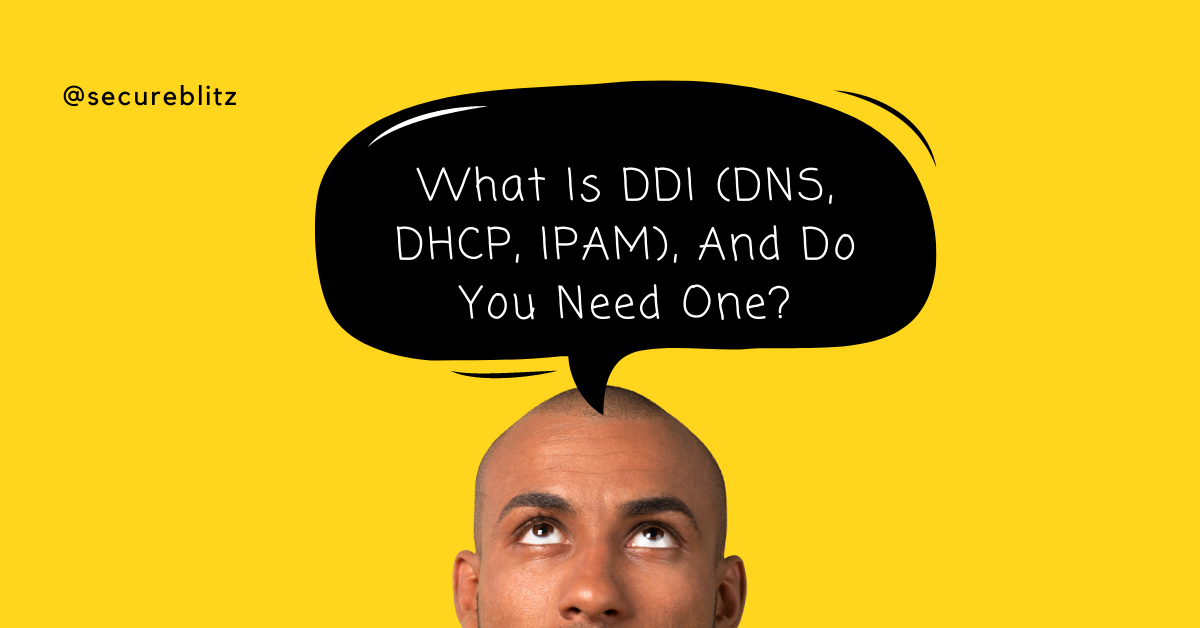Here, we will answer the question – what is DDI (DNS, DHCP, IPAM), and do you need one?
DDI does not have a single definition. Collectively, DNS-DHCP-IPAM is referred to as DDI in networking.
To better understand the DDI definition, we must first understand the meaning of its three legs (DNS-DHCP-IPAM). It combines all three critical components – DNC, DHCP, and IPAM – into a single package, making them easier to control and manage in the long run.
Table of Contents
What Is DNS?
The Domain Name System (DNS) is the Internet’s phone book. We have to type the name of a website like lthr.com if we want to open it.
Web browsers interact through Internet Protocol (IP) addresses. DNS converts domain names to IP addresses, allowing browsers to access information on the Web.
What Is DHCP?
The Dynamic Host Configuration Protocol (DHCP) is a network management protocol that assigns the IP address and other information to each host on the network dynamically so that they can effectively communicate.
DHCP automates and centralizes IP address allocation, making network administration easier. When a device joins a network, such as a laptop or a smartphone, it normally requests an IP address from a DHCP server.
What Is IPAM?
IPAM is any method of planning, tracking, and managing IP addresses on your network. Every device on every network, whether hardwired or wireless, has an IP address.
Hundreds of thousands of IP addresses can be found in enterprise networks. It’s hard to keep track of everything manually. While IPAM involves more than simply assigning IP addresses to devices, doing so manually would be impossible.
What Are The Benefits Of The DDI Solution?

There are obvious vulnerabilities when DNS, DHCP, and IPAM are controlled separately. A centralized solution, on the other hand, provides network managers with visibility and management over their network. This provides administrators with the following benefits:
Management Automation
Network management automation is the first benefit of employing a DDI solution. There are numerous compelling reasons to automate. It reduces the possibility of human error and eliminates the need for physical labor, resulting in increased efficiency and more time for other duties.
Network Efficiency
DDI can also be used to improve network efficiency. When you automate your network management operations, you can ensure everything is done correctly. This means less downtime and a more enjoyable experience.
Your network will always run efficiently with a DDI solution, which will centralize all your network services. This means you’ll spend less time managing your network and can relax knowing it’s handled properly.
READ ALSO: Full Surfshark VPN Review 2024 [Fast & Reliable]
DDI: The Cornerstone of Your Network’s Addressing System (FAQs)
DDI, which stands for DNS (Domain Name System), DHCP (Dynamic Host Configuration Protocol), and IPAM (IP Address Management), is a fundamental suite of services that forms the foundation of your network’s addressing system. Let’s dive into some FAQs to understand what DDI is and whether you need it:
What is DNS, DHCP, and IPAM?
DNS (Domain Name System): DNS is the internet’s phonebook. It translates user-friendly domain names like mobiletechify.com into numerical IP addresses that computers can understand.
DHCP (Dynamic Host Configuration Protocol): DHCP acts like an automatic landlord for your network’s IP addresses. It assigns IP addresses to devices connecting to the network, ensuring each device has a unique communication address.
IPAM (IP Address Management): IPAM is the record-keeper for your IP addresses. It tracks information about assigned and unassigned addresses, helping you efficiently manage and optimize your IP address space.
What is the difference between DDI and IPAM?
DDI refers to the integrated combination of these services (DNS, DHCP, and IPAM) offered as a unified solution. IPAM, on the other hand, can be a standalone service managing just IP addresses.
READ ALSO: Today’s Most Common Threats Against Cybersecurity
What are the benefits of using DDI?
- Simplified Management: DDI offers a centralized platform to manage all your DNS, DHCP, and IPAM needs, streamlining administration and reducing complexity.
- Improved Efficiency: Automation features in DDI solutions can save time and effort compared to managing these services separately.
- Enhanced Security: Integrated DDI solutions can provide better security features and improve network visibility.
- Reduced Errors: Centralized management can minimize configuration errors when managing separate services.
Do I need DDI?
Here are some factors to consider when deciding if you need DDI:
- Network Size and Complexity: DDI can significantly improve manageability for larger networks with many devices and a growing IP address space.
- Security Concerns: A unified DDI solution can offer better control and visibility if you have strict security requirements.
- Administrative Resources: If your IT team is stretched thin, DDI’s automation and centralized management benefits can be a time-saver.
Conclusion
In essence, if you have a small home network, you might not necessarily need a complex DDI solution.
However, DDI can be a valuable tool for businesses or organizations with growing networks to streamline network management, improve efficiency, and enhance security.
INTERESTING POSTS
About the Author:
Daniel Segun is the Founder and CEO of SecureBlitz Cybersecurity Media, with a background in Computer Science and Digital Marketing. When not writing, he's probably busy designing graphics or developing websites.






